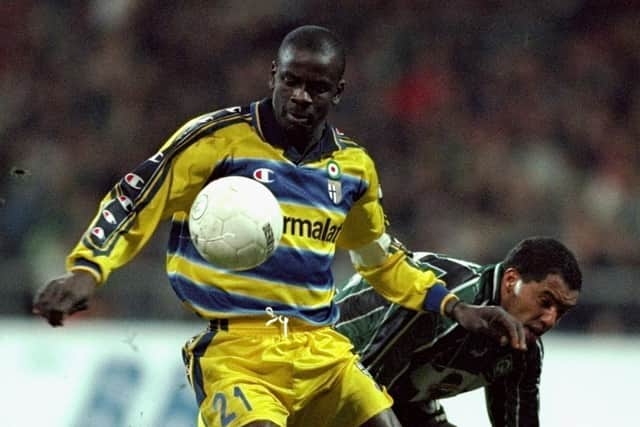Lilian Thuram: Amid England-Scotland debate, France legend and anti-racism campaigner has say on taking knee - and much more
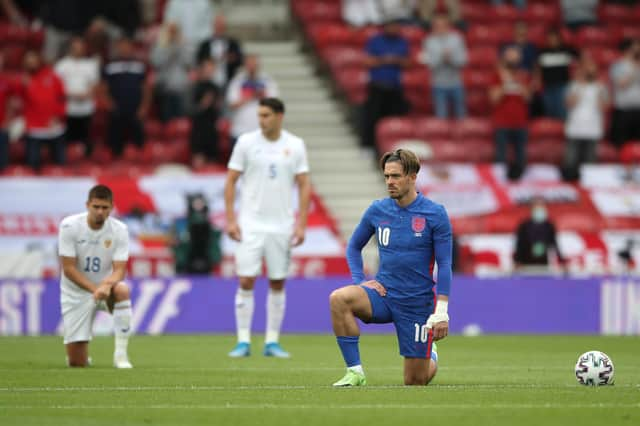

One is the iconic French footballer. A defender who, across a stellar career that took him from Monaco to Parma, Juventus and finally Barcelona, became his country’s most capped player, and the cornerstone of the World Cup triumph in 1998 and the European Championships two years later.
The other Thuram is the devoted and passionate rights campaigner that the 49-year-old has become since his playing days ended. A man who established a Foundation For Education Against Racism, and has turned to the written word, with his first book, My Black Stars, now translated into English.
Advertisement
Hide AdAdvertisement
Hide AdYet, Thuram – inspired to write it because slaves were the only people of his skin colour he was told about in school, not scientists, explorers, philosophers and the so many more black pioneers that he has chronicled – doesn’t have to think twice when asked about the legacy he hopes for.
“It isn’t difficult,” he said, speaking after the book’s launch hosted by Scotland s National Centre for Languages/University of Strathclyde this week. “I’m extremely proud of winning the World Cup, and all that I did in my career. But at the end of the day being a footballer was my job. Fighting for equality is my life, though, what makes me proudest, and how I would like to be remembered.”
Contempt against backlash
Thuram was determined to “change the world” when his days of travelling across it for his day job were coming to a close. Depressingly, on the matter of racism, Euro 2020 across these isles has demonstrated just how much attitudes to the scourge still require challenging. The build-up to the finals has been dominated by the booing England players received from their own supporters in warm-up encounters and the fears this will be repeated when they take to the Wembley pitch for their opener against Croatia.
Scotland have also been drawn into confected controversies over the gesture being imagined as a political espousal of Marxism through associations with the Black Lives Matter movement. A clutch of crank right-wingers among the country’s commentariat deliberately misconstrued Scotland players’ decision to stand as a repudiation of taking the knee. It was, instead, an attempt to send a stronger message through feeling taking the knee had lost some of its power across the season that players have been taking the action.
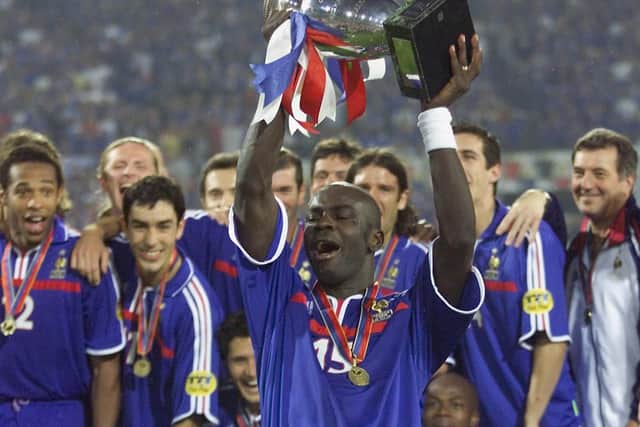

As a result, the anti-lobby over taking the knee merely doubled down on their ignorance over footballers’ motivations for highlighting racism. However, Scotland have refused to be used as some sort of tool for those with barely concealed agendas. Powerful statements from captain Andy Robertson and manager Steve Clarke as to why they will take the knee when facing England at Wembley on Friday in solidarity with the home players laid that out. Thuram struggles to contain his contempt for the backlash against the taking the knee, and the excuse-mongering about the requirement to keep politics out of football that is offered up for it.
Politics talk
“I didn’t see the images when they happened but I’ve been shocked to hear about it. Though not surprised,” said Thuram, who was awarded an honorary degree from Stirling University for his campaigning two years ago. “There are always people who don’t like it when you call out racism for what it is. I see that type of booing in the stadium as a way to try and put people highlighting racism back in their box. Those booing are saying, ‘you want to bring your anti-racism message here and we reject that’. It is so disappointing to see that reaction in football.
“I’m not sure whether it is stupidity or something else that is involved in those arguments being put forward about Marxism. For me, to whistle or boo players who are trying to send out an anti-racism message is quite obviously a political act in itself … by those selfsame people saying politics has no place in football.
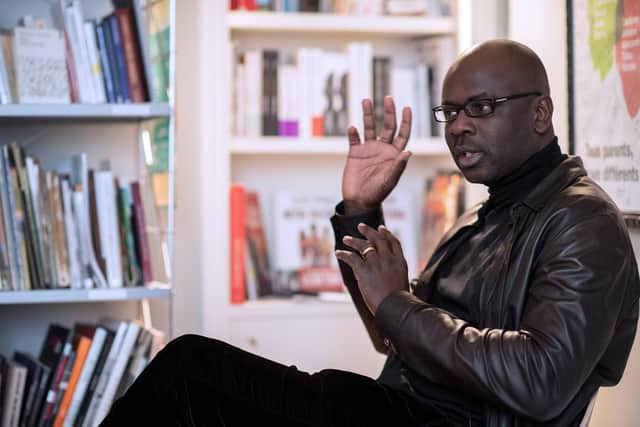

“Politicians who defend what has happened in the stadiums with the booing, they are taking the easy way out because they see votes in it. It’s members of the majority population booing people who are kneeling to show their support of a minority population. It is facile politics.
Advertisement
Hide AdAdvertisement
Hide Ad“Those people in the stadiums booing are effectively saying, ‘we don’t want politics to come into football, we want things to stay exactly the way they are’. But not wanting change in football or society is in itself a political position. Football does not exist outside of politics; it is part of the world. Having sponsors’ logos on your shirt, the naming of stadiums, all of these things are part of a wider political and economic structure and you cannot just choose the bits you want.
“There is nothing more political than football. And the ridiculous talk of a Marxist agenda in it, seems to miss the fact that football is the best way of selling capitalism at the moment. It’s the most visible face of capitalism, part of the capitalist enterprise.”
Use your profile
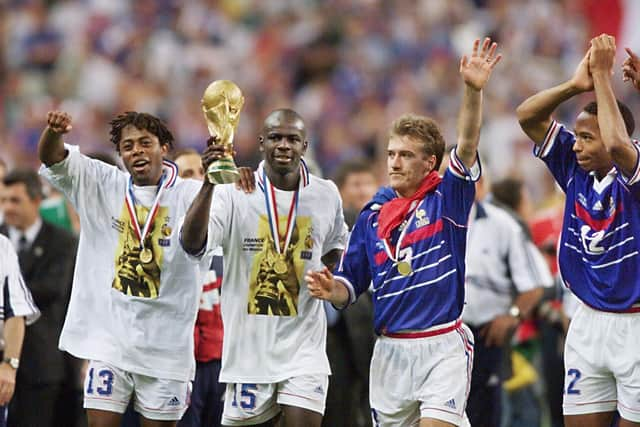

England manager Gareth Southgate demonstrated his refusal to be cowed in pushing for change with his “Dear England” this week, a powerful, moving and eloquent missive in which wrote of rallying round his booed players and he and his squad’s “responsibility to the wider community”, in what was an appeal for unity over their taking the knee. Clarke, meanwhile, took on the xenophobes with a statement on Friday in which he said “we must also be unequivocal in condemning the opportunistic false narrative being presented by some” over their standing gesture he made plain was “against racism and all forms of unacceptable and discriminatory behaviour across society,” and confirmed “for our match at Wembley, we will stand against racism and kneel against ignorance.” Thuram is conscious of the need for white allies, and for players and managers to be willing to use their profile and standing to confront prejudice.
“Football, as the leading world support, has the power to change people’s collective imagination,” he said. “So the very fact of seeing black players, players of different racial origin, in a team can change how you view that ethnic minority within the country. It is legitimate for a black person to be seen as French, English, Scottish or whatever, because you can see them as part of a mixed team, see them as part of the country. And you need people like those managers to stand up and articulate that, to say it publicly. It is not just about seeing players of different ethnic origins then, it is about those in positions of power saying ‘this is what we are doing, we are defending a mixed society’.
“Players get called on all the time for different campaigns; anti-poverty, to encourage children to read, all sorts of initiatives. And it is acceptable for players to be involved in these campaigns. But racism, and standing up against racism, is cast as problematic, as if it is something you can’t legitimately take a stand against… yet, many players will suffer from racism on a daily basis. It’s just that the public don’t see that.
"It is strategy that has worked throughout history: you always seek to make racism invisible. And the key way to do that is by silencing those who suffer from it – you hide them from view so that those people don’t get to speak up. So you can then pretend it doesn’t exist. With the whistling in the stadiums, I would read that those doing that are saying, ‘you have no right to stand up against racism’. What we need to do then is encourage taking the knee, encourage black players, and white players and managers, to speak up and use their voice to make that racism visible.”
My Black Stars: From Lucy to Barack Obama by Lilian Thuram, is edited by David Murphy and translated by Laurent Dubois. For further information go to www.liverpooluniversitypress.co.uk
